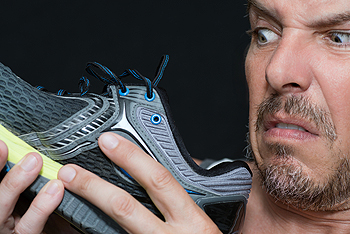What Is Plantar Hyperhidrosis?
Monday, 07 January 2019 00:00 The medical condition that is referred to as planter hyperhidrosis is defined as excessive sweating of the feet. Many patients may experience extreme discomfort, and this may be a result of shoes and socks that are frequently wet. There are several symptoms that may be associated with this ailment, and these may include foot infections such as toenail fungus or athlete’s foot, blisters on the feet that may come from excessive friction, or a strong and unpleasant foot odor. There may be preventive measures that can be implemented to ease the discomfort of plantar hyperhidrosis, including utilizing antiperspirants on the feet, wearing layers of cotton socks, which may be helpful in absorbing sweat, or taking oral medications. If you are afflicted with this uncomfortable foot condition, it is suggested to speak with a podiatrist who guides you to begin the correct treatment.
The medical condition that is referred to as planter hyperhidrosis is defined as excessive sweating of the feet. Many patients may experience extreme discomfort, and this may be a result of shoes and socks that are frequently wet. There are several symptoms that may be associated with this ailment, and these may include foot infections such as toenail fungus or athlete’s foot, blisters on the feet that may come from excessive friction, or a strong and unpleasant foot odor. There may be preventive measures that can be implemented to ease the discomfort of plantar hyperhidrosis, including utilizing antiperspirants on the feet, wearing layers of cotton socks, which may be helpful in absorbing sweat, or taking oral medications. If you are afflicted with this uncomfortable foot condition, it is suggested to speak with a podiatrist who guides you to begin the correct treatment.
If you are suffering from hyperhidrosis contact Dawn Miles, DPM of Florida. Our doctor can provide the care you need to attend to all of your foot and ankle needs.
Hyperhidrosis of the Feet
Hyperhidrosis is a rare disorder that can cause people to have excessive sweating of their feet. This can usually occur all on its own without rigorous activity involved. People who suffer from hyperhidrosis may also experience sweaty palms.
Although it is said that sweating is a healthy process meant to cool down the body temperature and to maintain a proper internal temperature, hyperhidrosis may prove to be a huge hindrance on a person’s everyday life.
Plantar hyperhidrosis is considered to be the main form of hyperhidrosis. Secondary hyperhidrosis can refer to sweating that occurs in areas other than the feet or hands and armpits. Often this may be a sign of it being related to another medical condition such as menopause, hyperthyroidism and even Parkinson’s disease.
In order to alleviate this condition, it is important to see your doctor so that they may prescribe the necessary medications so that you can begin to live a normal life again. If this is left untreated, it is said that it will persist throughout an individual’s life.
A last resort approach would be surgery, but it is best to speak with your doctor to find out what may be the best treatment for you.
If you have any questions please feel free to contact one of our offices located in Palatka and Saint Augustine, FL . We offer the newest diagnostic and treatment technologies for all your foot and ankle needs.









